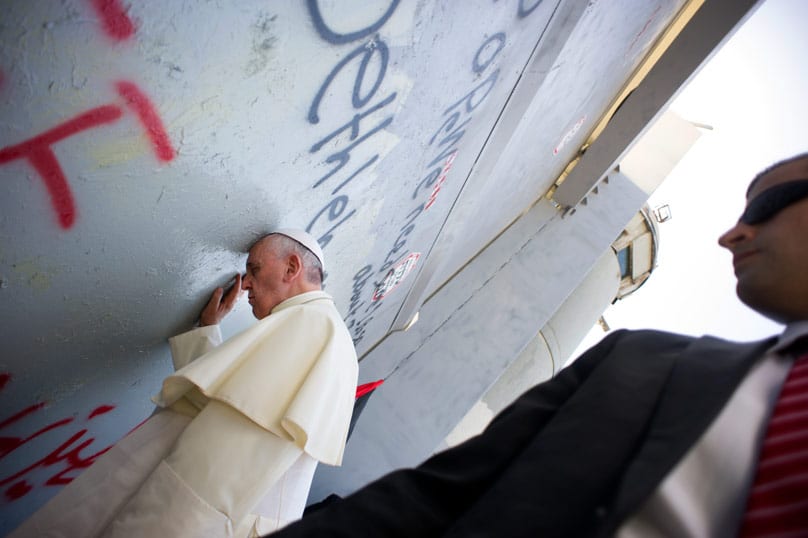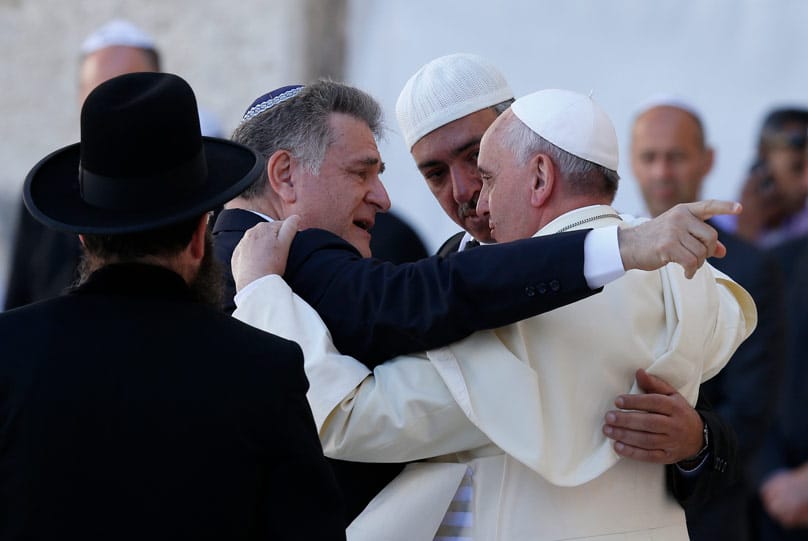
On Pentecost three years ago the Holy Father hosted a prayer meeting for peace with the Patriarch Bartholomew I of Constantinople; the President of Israel, Shimon Peres, and the President of the Palestinian Authority, Mahmoud Abbas. This followed his impromptu invitation to the three when he was in the Middle East two weeks before. Promoting unity and peace in troubled parts of the world has been his constant passion.
True to script, Pope Francis does this in unscripted ways! On his way to Mass in Bethlehem, for example, he stopped his car at the graffiti-strewn barrier between Israel and the West Bank. Getting out and leaning his head against it, like someone praying at the Wailing Wall, he prayed for “harmony, union and peace in this land”. Even-handedly he also attended Yad Vashem, the holocaust museum, where he very movingly cried out “never again” and assumed the voice of God calling out to Adam after the original sin.
He prayed with the Orthodox Patriarch at the Holy Sepulchre and, in an extraordinary photographic moment, embraced a Jewish rabbi and a Muslim imam at the Western Wall.
These were treasured moments of unity and peace in the world’s most neuralgic region, where almost anything a man like the Pope does is interpreted as hurtful by someone. One of these tense moments was when the Holy Father celebrated Mass in the Cenacle, the very room where Christ is said to have celebrated the Last Supper, appeared to the frightened disciples on Easter night, and sent them the Holy Spirit at Pentecost. Because some Jews believe this is also the site of King David’s tomb they oppose Christians worshipping there and fear their government might cede the site to the Vatican or, worse, the Palestinian Christians. And so for weeks there were demonstrations. Yet when the Pope came in with such evident reverence and peace the demonstrations dissipated. It was from this very Cenacle, the Pope observed, where the Church was born, that “she set out, with the broken bread in her hands, the wounds of Christ before her eyes, and the Spirit of love in her heart.”

Today we join the Pope at that sacred site. Today we join his predecessor Peter, gathered with Mary and the Apostles at the first Pentecost awaiting the tongues of fire (Acts 2:1-11). Today we celebrate God as “the Lord, the Giver of Life”, who breathes His life into the Church. Who is this Person we call ‘Spirit’, ‘Breath’, ‘Fire’ and, most importantly for bioethicists, ‘Wisdom’ and ‘Life’? Where does He come from?
The second question first. When we recite the Creed we declare He “proceeds from the Father and the Son”. But beware: the Filioque – the ‘and the Son’ bit – was added late to the Creed and has divided Christians ever since. What’s more, our God language mostly works by analogy: to say the Holy Spirit “proceeds” has similarities but is not the same as what we mean when we say Archbishop Anthony proceeds from the sacristy into the chapel or that the directives of our conference organisers proceed from their desire to ensure that our colloquium proceeds smoothly!
So if the words are controversial and their meaning complicated, why on earth do we keep saying them every week? Because they do, in fact, convey essential truths about God the Holy Spirit and His relationship with the other two Divine Persons. The Holy Spirit, equal in divinity to the Father and Son, receives something from them both: His Divine Nature and mission. When he was in my hometown of Sydney for World Youth Day, Pope Benedict XVI taught us beautifully about the Holy Spirit. Drawing especially on the thought of St Augustine, he called the Holy Spirit “the bond of unity within the Blessed Trinity… unity as communion, unity as abiding love, and unity as giving and gift.” The Holy Spirit is “what is shared by the Father and the Son”. The Holy Spirit gives unity to the Father and Son, indeed He is the very unity or love of those two Persons eternally “giving themselves to each other”.
Now, before we start to think that that sort of theological carry-on has nothing to do with the struggles of the bioethicist or the healthcare professional, think again. If the Holy Spirit is the force Who unites the divine Persons eternally in love; if He is the One who proceeds from Them into our world and back to Them from our world; if He is “the Lord, the giver of life” to the world since creation and to the Church since the first Pentecost, as our faith proclaims; then: He it is Who unites human persons when they might be inclined to fall apart; He it is Who brings the Wisdom of the Father and the Son to us and draws us back with Him to them in eternity; and He it is Who breathes mortal life into our material flesh, eternal life into our mortal natures, and divine grace into our little dreams and projects. As St Augustine taught, it is the Holy Spirit who allows us to be and to remain in God and God to be and remain in us. If Christ is “God as flesh”, God in the flesh, the Holy Spirit is “God as Love” or God in love (De Trinitate 15.17.31).
Peter knew, as his successor Pope Francis knows, and as we all know deep down: that we cannot be as fully human and as adoptively divine as it is possible for us to be by our own efforts alone; as we have just heard in our keynote address, the true patient acknowledges in all humility that she is unable to remove herself from her illness; only by the Spirit’s power can we hope to overcome that which sickens our bodies, muddles our minds, divides our hearts, spoils our relationships.
Pentecost was, in a sense, the very first Christian colloquium, when the Holy Spirit descended in fire and wind, when Peter stood up and gave his keynote address to the newborn Church, when diverse people heard God and each other. And as those first disciples we begin with prayer, with the acknowledgement that we cannot do bioethics, or anything else, “on our own”. We know we need a Saviour, and we need that Spirit who ensures our relationship to the Saviour. We need to be consecrated by the Spirit of Truth, the Lord of Life, if we are to be Catholic bioethicists. And we need that healing peace that the world cannot give, and that is at the heart of our conference theme: peace of heart or conscience, as we navigate the difficult decisions in the practice of healthcare; peace of mind, as we seek comfort and confidence for both doctor and patient; and peace in society, as we build a compassionate healthcare culture that is about more than buy-and-sell. As we heard in our Gospel passage this evening, when the Risen Christ wanted truth, unity and peace for His disciples, He breathed the Holy Spirit upon them (Jn 20:19-23). Only by that Spirit’s wisdom would the Liar be vanquished and people be consecrated in the truth. Only by that Spirit’s power would sins be forgiven, and people be reconciled. Only by that Holy Spirit’s breath would diverse people be united as parts of one body that is Christ’s (2 Cor 12:3-13).
Come Holy Spirit, Lord of light,
come bless dark hearts and make them bright;
Come, on the soul thy peace bestow,
come us console amidst our woe.
Come, heal our wounds, our strength refill,
and bend our stubborn heart and will;
Come from the Father and the Son,
come heal our hate and make us one.
Homily for the Feast of Pentecost during the IACB Conference, Villa Palazzola Chapel, Italy, June 4 2017.
